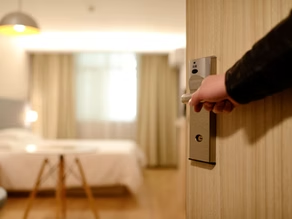Ultimate Guide to Accommodation in India post-Coronavirus

The Coronavirus has made it not only to travel out to any place but the fact that when we look at a new place or a new person, we get that feeling of being scared of catching the virus that our willingness to travel is also gripped. Such an extreme feeling has become really common and the fact that a new place or a new location might have a higher chance of getting a person infected restricts a traveler to even go out of their house. Making this feeling a new normal, traveling to a new place, and staying at that place is going to change for good to push towards safer means of travel. You think you know all about catching Coronavirus? Check this. When we think of staying and sleeping at an accommodation that is not our home, the first thing we think of is how many people have actually been here and used it? Is it really been cleaned after their stay? Or is it even safe from any disease that the person might carry? All of these questions are not just going to be our simple thoughts but a grave concern, a concern that will be needing complete addressing and safety measures that will make sure that these doubts are vanished as quickly as they come inside a traveler’s mind. Leading hoteliers believe that these concerns and risks can be simply taken care of with a few safety precautions and wearing a mask at all times when outside the accommodation. A woman wearing mask the right to stay safe. You can check out the guidelines by the government of India to make face masks at home here and make a mask for all your needs to be safe from Coronavirus. Travel includes staying at a new place(obviously!) and a traveler could have a preference for staying at a posh location that has all the amenities and a person need not even go out of the property to have fun, and a traveler could even have a preference of going with the cheapest closest option to stay for the night or the day and be gone the next morning. However extreme a traveler would want their accommodation preference to be, the coronavirus is set to bring a few changes to all of them. Checking-in to accommodation is the first thing that a traveler has to do to start their stay at a new place. During check-in, there can be several violations of social distancing norms, like touching each other’s documents, handling cash, staying close to the attendant at the reception, standing close to other guests, etc. Having a digital, contact-less check-in will be the new normal in each accommodation, where a traveler will just walk into a hotel and head directly for their room that will be pre-allocated to them before even their check-in. A possible tech-travel solution for this could be, no need to show any documentation or a booking voucher, just QR or bar code on the phone that enables the door and unlocks it for a traveler to enter the hotel premises or the accommodation premises and head straight for their rooms. Think twice before reaching out for the bell! Escalators, lifts, or staircases, which one to prefer? It is pretty much clear that lifts are our worst enemies when it comes to social distancing. Staying in close proximity to a person for longer than 10 seconds is always a factor of risk. So, stairs might be safer than lifts and you can even eliminate the bulk of the threat by not touching anything like the railing or handles and walking at a distance from anyone walking close to you. The common areas like lobby, gyms, pools, spas, etc. will have to be tackled with utmost safety. Since these areas attract a lot of visitors, there is not only a chance of catching the virus from coming in contact with an infected person but from a surface that was in contact with an infected person. These areas will be limiting the number of guests on the floor and ensuring that each area is cleaned off at regular intervals. Swimming pools are much safer when it comes to Coronavirus because chlorine does not let the virus sustain. You can have a chill time at the pool but make sure that there are not a lot of people present and you are still steering clear and swimming at a distance. Although not a lot of hotels have opened swimming pools, it is something to look out for. Swimming pools are not as dangerous as you might think. Eating at a restaurant is going to be a little problematic. Not exactly problematic but very different. There will be a lot fewer customers that would opt to eat out, and even if they do, restaurants need to have a strict policy of how many foodies can even be present at once in the vicinity. The best solution to eating a meal at your favorite restaurant would be to order room service. Sanitizing your hands and eating a meal in your room is the best way to stay safe and eat during a trip when the pandemic is still at large. Getting to the accommodation and checking-in is fine but how do you really stay? Remotes, handles, faucets, toilets, surfaces, room keys, etc. All can carry a potential risk to infect a person from this highly contagious virus. Now we have two options, either you go berzerk and start sanitizing every corner of the room you’ll be staying in, from the handles to the TV, or you make sure that you keep your hands clean every time you want to eat something or do an activity that might involve you touching your face repeatedly. If you’re really paranoid, sanitize the hell out of the entire room. Touching door handles? Better sanitize the hell out of

